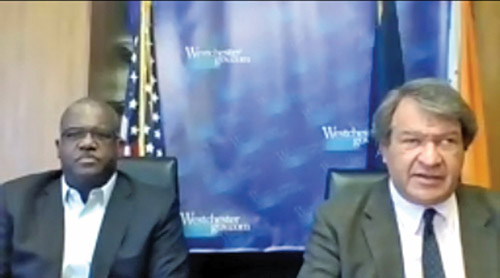
On Thursday, May 21, over 70 Westchester Jewish community leaders gathered via Zoom to celebrate Jewish History and Heritage month. In her opening remarks, Lisa Roberts stated, “We are grateful for our ongoing partnership with the Westchester County Executive, and we appreciate his time today, as well as Deputy County Executive Ken Jenkins.”
Roberts continued, “The relationships the council has built over time with our elected officials has enabled ongoing two-way communication that is both relevant and beneficial to our Jewish community. May is known as Jewish History and Heritage Month. Normally, we would be commemorating it with the Westchester County Board of Legislators, as we have done annually for years. We hope we will be able to resume that practice next year.”
Roberts then introduced Westchester County Executive George Latimer as a steadfast friend to the Jewish community, one whose leadership can be depended on. “We appreciate the opportunity to be here with all of you,” expressed Latimer. “This is a time like no other and it has been extended now into two and a half months of change in our society. We have missed so many major activities, major ceremonies and celebrations. The Passover season came in a way like no other. Mother’s Day was not quite the same, but none of it changes the way we feel.”
Latimer continued, “We spoke just a few weeks ago on Yom HaShoah, commemorating the deaths of six million Jews, which were at the hands of the Nazis. We recognize that we can never forget. It doesn’t matter if it is a convenient time to remember when other things are happening in society. There is still that urgency to recognize and rejoice as well as to recognize and to set forward policies that we think will help our brothers and sisters. So that is not just a celebration that is static but it is organic and growing as we go forward as Westchester neighbors and residents.”
Jenkins added, “Being able to celebrate over a video conference, making sure our friends and families are safe, are of the utmost importance.”
Latimer then used this opportunity to update the Jewish leaders on how Westchester County is doing against the COVID pandemic. “We were the first, but we have not turned out to be the worst,” Latimer stated. “Over 32,500 individuals have tested positive for COVID in Westchester County. Over 30,000 of those individuals have gone through a two-week incubation period and either did not get sick at all, or went through some mild sickness or might have been hospitalized and now are released. We are now operating on 2,000 active cases of people who tested positive but have not cleared the two-week period.”
Latimer added, “We are working under the presumption that there are slightly fewer than 400 people in the county hospitalized for COVID. Seven weeks ago, at the end of March, beginning of April, we were at our peak where we had over 1,200 people hospitalized. The death toll is obviously profound. We have lost over 1,300 people to this disease and it affected disproportionately those of a certain age and older. Two out of every three people who have passed away are the age of 70 or older. Thirteen percent of Westchester County has been tested for COVID and that is greater than other jurisdictions.”
Westchester is part of the Mid-Hudson region. “When we reopen, the governor has established a four-phase reopening. Phase One will open up construction, manufacturing and curbside retail. In Phase Two, all retail will come back and administrative offices will come back, including insurance, finance, law, governments or an office structure when you are not dealing with the public. For Phase Three, they have identified restaurants and other similar type of accommodations. Finally, Phase Four is the opening of broader based issues, like K-12 education, higher education, arts, entertainment and recreation, like summer concerts in the parks and major league baseball,” explained Latimer.
“Being able to work through how each congregation can have services, how does a minyan function in an environment of social distancing—those are things that have to be worked out successfully so that you can have a religious ceremony that matters, at the same time we deal with the public health ramifications,” he said, making it clear that opening of houses of worship and having them in operation is important to him.









